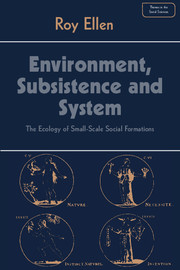Book contents
- Frontmatter
- Contents
- Preface
- Acknowledgements
- 1 ENVIRONMENTAL DETERMINISM AND CAUSAL CORRELATION
- 2 POSSIBILISM AND LIMITING FACTORS
- 3 CULTURAL ECOLOGY AND THE EXPLANATORY IMPERATIVE
- 4 HUMAN ECOLOGY AND THE BIOLOGICAL MODEL
- 5 THE FLOW OF ENERGY AND MATERIALS
- 6 ECOSYSTEMS AND SUBSISTENCE PATTERNS I
- 7 ECOSYSTEMS AND SUBSISTENCE PATTERNS II
- 8 SYSTEMS AND THEIR REGULATION
- 9 INFORMATION AND THE MANIPULATION OF THE ENVIRONMENT
- 10 ADAPTATION: A SUMMARY AND RECONSIDERATION
- 11 THE REPRODUCTION AND EVOLUTION OF SOCIAL AND ECOLOGICAL SYSTEMS
- 12 ECOLOGY IN ANTHROPOLOGICAL METHOD AND THEORY
- Notes
- Bibliography
- Name Index
- Subject Index
6 - ECOSYSTEMS AND SUBSISTENCE PATTERNS I
Published online by Cambridge University Press: 05 June 2012
- Frontmatter
- Contents
- Preface
- Acknowledgements
- 1 ENVIRONMENTAL DETERMINISM AND CAUSAL CORRELATION
- 2 POSSIBILISM AND LIMITING FACTORS
- 3 CULTURAL ECOLOGY AND THE EXPLANATORY IMPERATIVE
- 4 HUMAN ECOLOGY AND THE BIOLOGICAL MODEL
- 5 THE FLOW OF ENERGY AND MATERIALS
- 6 ECOSYSTEMS AND SUBSISTENCE PATTERNS I
- 7 ECOSYSTEMS AND SUBSISTENCE PATTERNS II
- 8 SYSTEMS AND THEIR REGULATION
- 9 INFORMATION AND THE MANIPULATION OF THE ENVIRONMENT
- 10 ADAPTATION: A SUMMARY AND RECONSIDERATION
- 11 THE REPRODUCTION AND EVOLUTION OF SOCIAL AND ECOLOGICAL SYSTEMS
- 12 ECOLOGY IN ANTHROPOLOGICAL METHOD AND THEORY
- Notes
- Bibliography
- Name Index
- Subject Index
Summary
The task of describing and analysing different patterns of human subsistence is a complex matter, and one which has been very much underrated. The bulk of contemporary anthropology has concerned itself with the discovery and elucidation of elaborate hidden networks and subtle symmetries, whereas subsistence activities have been regarded as simple, undifferentiated and tediously repetitive wherever they are found. This is a fatal error. Much of what we say about the operation of specific social systems must hinge on an accurate appreciation of how social relations articulate with patterns and techniques of subsistence. One of the most important contributions which ecological approaches have made is to provide the tools and information for the analysis of subsistence. In this chapter and the next I explore the kinds of anthropologically relevant data which can be collected on the ecology of subsistence, and which facilitate productive analysis of specific populations and comparative enquiries. I have selected illustrative material from a large number of studies. Some of the material is undoubtedly unsatisfactory, and some forms part of wider analyses which are highly problematic. This, however, should not detract from their didactic value.
VARIATION IN HUMAN ECOLOGICAL SYSTEMS
Ecosystems of which human populations are a part vary enormously in their distinctive characteristics. They do so not only because populations find themselves in different environments, but because they solve the problems of biological reproduction and the reproduction of social structures in different ways.
- Type
- Chapter
- Information
- Environment, Subsistence and SystemThe Ecology of Small-Scale Social Formations, pp. 123 - 153Publisher: Cambridge University PressPrint publication year: 1982



